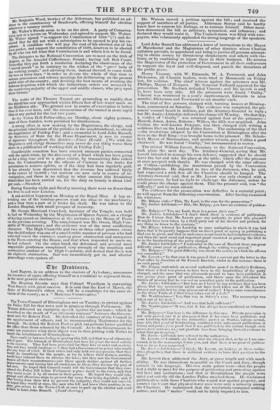The works of the Thames Tunnel are proceeding so rapidly
that the shield has now approached within fifteen feet of low-water mark on the Middlesex side. The ground now in course of excavation is better than it lets ever been, and the construction of the tunnel is more rapid than at any period for the last two years. At the Union Hall Police-office, on Monday, about eighty persons, most of them females, were punished for drunkenness.
A strong effiwt is now making by the Magistrates, the clergy, and the priacipal inhabitants of the parishes in the neighbourhood, to obtain the.sappression of Fairlop Fair; and a memorial to Lord John Russell, the Secretary of State for the Ilmne Department, is now in coarse of signature throughout the distriet.—Essex Herald. [We \Nish the Magistrates and clergy themselves may never do any thing worse than share in a jollification of working-folk at Fairlop Fair.] Considerable sensation has been created amongst parties connected with the spirit-trade, by the discovery of a fraud which has been going on for a long time and to a great extent, by transmitting false orders from the Customhouse to the officers of Customs in the docks for permission to remove spirits, as if the duty had been regularly paid. It has already been discovered that the revenue has suffered lately to the extent of 50,0001. ; but matters are now only in course of in- vestigation, and there is no telling to what amount this fraudulent transaction has been carried on, for the duty on brandy is about 13u/. per cask.— Standard.
During Saturday night and Sunday morning there were no fewer than ten fires in and near London.
A sad accident happened on Monday at the Royal Mint. A boy at- tending one of the coining-presses went too close to the machinery, and a blow from a part of it broke his skull. He was taken to the London Hospital, with small prospect of recovery.
Mr. George Moreland Crawford, barrister of the Temple, was held to bail on Wednesday by the Magistrates of Queen Square, On a charge of having caused an obstruction at the entrance to the House of Peers on the previous evening. The complainant was Mr. Owen, High Con- stable of Westminster ; and the evidence was of the most conflicting character. The High Constable and two or three other persons swore that the defendant was one of' a considerable number of persons who had collected round the entrance, causing great obstruction and annoyance to the Peers entering the house, arid that when requested to move on, he had refused. On the other hand, the defendant and several most respectable gentlemen complained very strongly of the insulting and overbearing conduct of 'he High Constable, and denied that there was the slightest obstruction. Bail was immediately put in, and ulterior proceedings were spoken of.


























 Previous page
Previous page